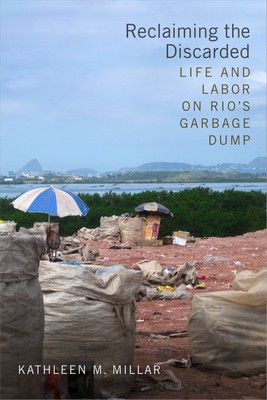
- We will send in 10–14 business days.
- Author: Kathleen M Millar
- Publisher: Duke University Press
- ISBN-10: 082237031X
- ISBN-13: 9780822370314
- Format: 15.8 x 23.4 x 1.8 cm, hardcover
- Language: English
- SAVE -10% with code: EXTRA
Reviews
Description
In Reclaiming the Discarded Kathleen M. Millar offers an evocative ethnography of Jardim Gramacho, a sprawling garbage dump on the outskirts of Rio de Janeiro, where roughly two thousand self-employed workers known as catadores collect recyclable materials. While the figure of the scavenger sifting through garbage seems iconic of wageless life today, Millar shows how the work of reclaiming recyclables is more than a survival strategy or an informal labor practice. Rather, the stories of catadores show how this work is inseparable from conceptions of the good life and from human struggles to realize these visions within precarious conditions of urban poverty. By approaching the work of catadores as highly generative, Millar calls into question the category of informality, common conceptions of garbage, and the continued normativity of wage labor. In so doing, she illuminates how waste lies at the heart of relations of inequality and projects of social transformation.
EXTRA 10 % discount with code: EXTRA
The promotion ends in 5d.19:53:56
The discount code is valid when purchasing from 10 €. Discounts do not stack.
- Author: Kathleen M Millar
- Publisher: Duke University Press
- ISBN-10: 082237031X
- ISBN-13: 9780822370314
- Format: 15.8 x 23.4 x 1.8 cm, hardcover
- Language: English English
In Reclaiming the Discarded Kathleen M. Millar offers an evocative ethnography of Jardim Gramacho, a sprawling garbage dump on the outskirts of Rio de Janeiro, where roughly two thousand self-employed workers known as catadores collect recyclable materials. While the figure of the scavenger sifting through garbage seems iconic of wageless life today, Millar shows how the work of reclaiming recyclables is more than a survival strategy or an informal labor practice. Rather, the stories of catadores show how this work is inseparable from conceptions of the good life and from human struggles to realize these visions within precarious conditions of urban poverty. By approaching the work of catadores as highly generative, Millar calls into question the category of informality, common conceptions of garbage, and the continued normativity of wage labor. In so doing, she illuminates how waste lies at the heart of relations of inequality and projects of social transformation.


Reviews